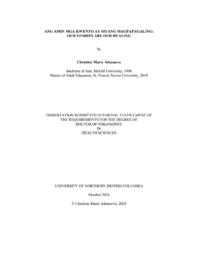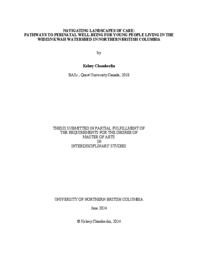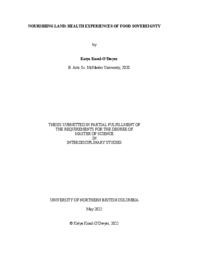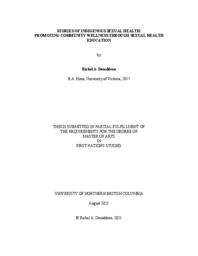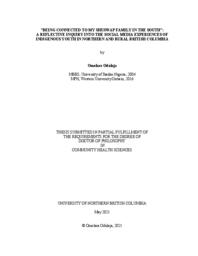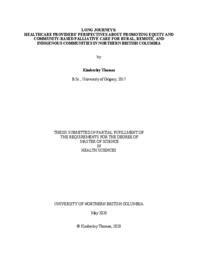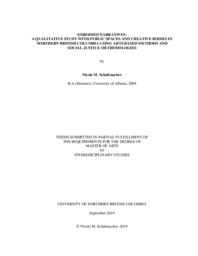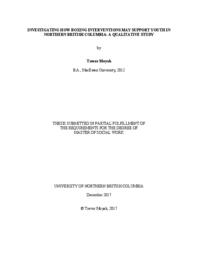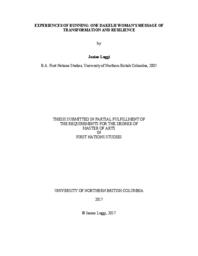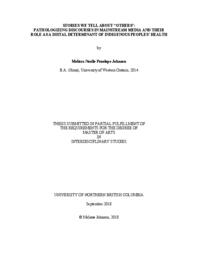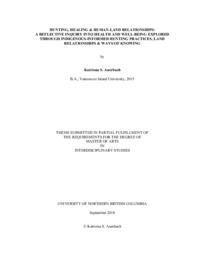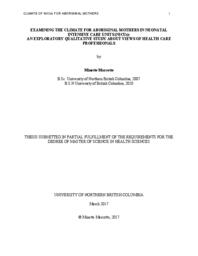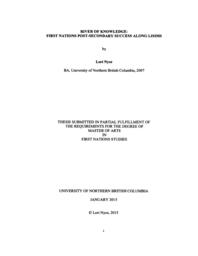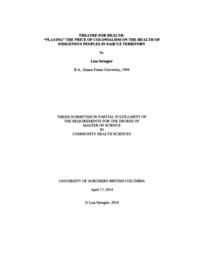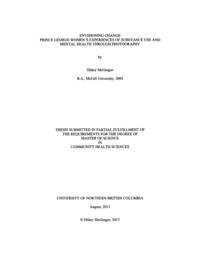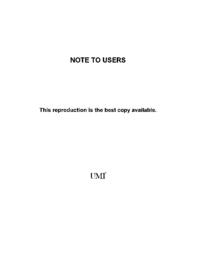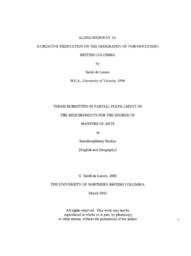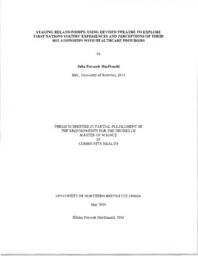de Leeuw, Sarah
Person Preferred Name
Sarah de Leeuw
Related Works
Content type
Digital Document
Origin Information
Content type
Digital Document
Origin Information
Content type
Digital Document
Origin Information
Content type
Digital Document
Description / Synopsis
Indigenous food sovereignty— a living reality prior to colonization, which violently disrupted Indigenous food systems—is characterized by Indigenous peoples’ self-determination in controlling their food systems and culturally informed foods practices. Directly related to ongoing coloniality, food insecurity is central to the disproportionately high burdens of poor health affecting Indigenous peoples. By exploring the health-related experiences of food sovereignty and Indigenous food sovereignty leaders living in northern BC, this project asks both: How does engaging in food sovereign practices affect peoples’ health? What are the factors that foster (or limit) food sovereignty practices? Being sensitive to past and ongoing colonial and paternalistic research approaches, this research enacts a community-informed ethos, anchored in community-based participatory research (CBPR) processes, wherein research is conducted with and for those involved. This research draws on qualitative methods, including semi-structured (virtual) interviews with community members and knowledge holders, including diverse food sovereignty and Indigenous food sovereignty champions. Champions are involved in various capacities, including direction of research design, engaging in interviews, and informing research outputs. Addressing gaps in the literature, this research documents holistic health experiences of food sovereignty and Indigenous food sovereignty leaders in northern BC. By highlighting experiences faced by those enacting food sovereignty practices, this research offers a counterview to existing bodies of food and health-related research and literature that rely predominantly on quantitative food security metrics. This project’s findings contribute to a growing body of scholarship documenting food sovereignty praxis: the work thus has the potential to inform policy that helps to support the resilience and self-determination of those doing food sovereignty and Indigenous food sovereignty.
Origin Information
Content type
Digital Document
Description / Synopsis
Indigenous communities and peoples have experienced erosion of their sexual wellness since contact with European peoples. Effective sexual health education is a human right shown to be an important part of overall health and wellness. Little research has been done on how to develop and implement sexual health education for Indigenous populations. This study utilizes an environmental scan to gain a comprehensive understanding of programming available for Indigenous peoples in BC, coupled with conversational style interviews with community storytellers to highlight effective practices. The findings of this research demonstrated that programs focused on promoting healthy sexuality generally or preventing HIV/AIDS and STBBI transmission while promoting safety and access to culture, utilized peer led approaches, and focused primarily on delivering services to youth. Storytellers demonstrated a strong passion for building relationships with participants and communities through engaging, accessible, and relevant sexual health education.
Origin Information
Content type
Digital Document
Description / Synopsis
This research extends and explores two key concepts. First, cultural preservation is important to Indigenous health and wellbeing. Second, when Indigenous youth spend quality time (whether online or offline) on issues pertaining to their identity and sense of self, that time can be key to preserving Indigenous cultures. This research project was an exploratory study carried out using a variety of research methods, including online surveys, semistructured interviews, and open ended storytelling engagements. In this study, youth ages 15 to 24 years interacted with one another in online and offline spaces, which in some cases served as culturally safe wellbeing sites where their self-esteem increased, especially if they were mentored by Indigenous peers and adults. This study found out that Indigenous youth are active social media users and engage in all kinds of activities including self presentation, social connections, cultural activities, and advocacy. The risks and benefits of using social media for identity expression and cultural engagement were identified, but some youth were noted to require supports to engage safely on social media to derive maximum benefits. The interdisciplinary nature of the research merges concepts, theories, and ideas from First Nations Studies, Sociology, Community Health, and Media Studies. This project embraced methodologies employed in these various disciplines but used a Two-Eyed Seeing framework as a tool to ensure cohesiveness in the research and respect for Indigenous cultures and cultural protocols. The research ultimately unfolded using lenses of both Indigenous and nonIndigenous worldviews, which I believe contributed greatly to the richness of the findings.
Origin Information
Content type
Digital Document
Description / Synopsis
Inequitable access to palliative care in Canada is a pressing issue. People with life-limiting illnesses in rural and remote northern and Indigenous geographies in British Columbia (BC) face ethically problematic barriers to receiving palliative care. Palliative approaches that are equity-oriented and community-based bring significant improvements to the healthcare system and to people's quality of life. The purpose of this qualitative study was to find ways to promote health equity and community-based palliative care. This research is informed by action-oriented, anti-colonial, and critical Indigenous methodologies. As perspectives of frontline healthcare workers offer transformative insights, palliative care providers working in northern BC were interviewed, and, from their interviews, three main themes emerged. These were (1) Support Primary Palliative Care, (2) earlier and inclusive Integration of Palliative care, and (3) Culturally Safe Palliative Care. The implications of these findings are situated at the intersection of cultural safety, public health, and health promotion.
Origin Information
Content type
Digital Document
Description / Synopsis
This research explores how the body is implicated in transmuting meaning for women who are substance dependent on opioids and have engaged in survival sex work. Using a hybridized application of narrative, theorizing, and interviews, this interdisciplinary thesis identifies some of the ways these women navigate the constraints of their marginalization. Eight women were interviewed on the traditional, ancestral, and unceded territory of the Musqueam, Squamish, and Tsleil-Waututh Nations in Vancouver, British Columbia. The research works to acknowledge and explore how these women exist in an ‘alternate’ economy in order to obtain opioids to meet their life-needs. The employment of materialist feminist examinations of alienation and access to capital located shared experiences in the women’s narratives. Though the research did not reveal an explicit connection between the body, meaning, and sex work, there was a strong indication of meaning making through advocacy and engagement with those in similar social positions.
Origin Information
Content type
Digital Document
Description / Synopsis
Federal laws in the Russian Federation set out restrictive criteria for Indigenous peoples to be recognized politically, socially, and culturally as Indigenous Small Numbered Peoples of the north (KMNS). These criteria emphasize “traditionality,” a strategic tactic equating indigeneity with rural landscapes and thus discounting urban Indigenous individuals and communities as modern political and self-determining subjects. Stories from Indigenous women living in Yakutsk, the capital city of Sakha Republic (Yakutia) challenge these narratives by reconstituting the urban landscape from an Indigenous perspective. The challenges emanating from urban landscapes, and relationships integral to navigating these challenges, are examined in this thesis from a critical Indigenous feminist geographical framework, honouring and celebrating the numerous manifestations of urban indigeneity entangled throughout Yakutsk.
Origin Information
Content type
Digital Document
Description / Synopsis
This multidisciplinary arts-based research-creation study explored health and wellness realities, including my own, of people in northern British Columbia. In two public settings, autoethnographic creative writing was translated into installations and performances. The use of arts-based methods in this study was intended to evoke participants’ intuitive ways of knowing, leading to (re)connection with self, body, and land/place: in short, to resilience. The broadest question of the research was: Can practices anchored in creative/performative autoethnography and body-attuned narrative help people in northern landscapes attend to mental health and healing? The findings emphasized achievable potentials for individual and community resilience, as well as renewed connection to place, through creative interventions that engage narrative in sensorial ways. Findings also emphasized the importance of selfdetermination and agency within the design of creative interventions, and the implications for healing through witnessing narrative.
Origin Information
Content type
Digital Document
Origin Information
Content type
Digital Document
Origin Information
Content type
Digital Document
Origin Information
Content type
Digital Document
Origin Information
Content type
Digital Document
Origin Information
Content type
Digital Document
Origin Information
Content type
Digital Document
Origin Information
Content type
Digital Document
Origin Information
Content type
Digital Document
Origin Information
Content type
Digital Document
Origin Information
Content type
Digital Document
Origin Information
Content type
Digital Document
Origin Information


